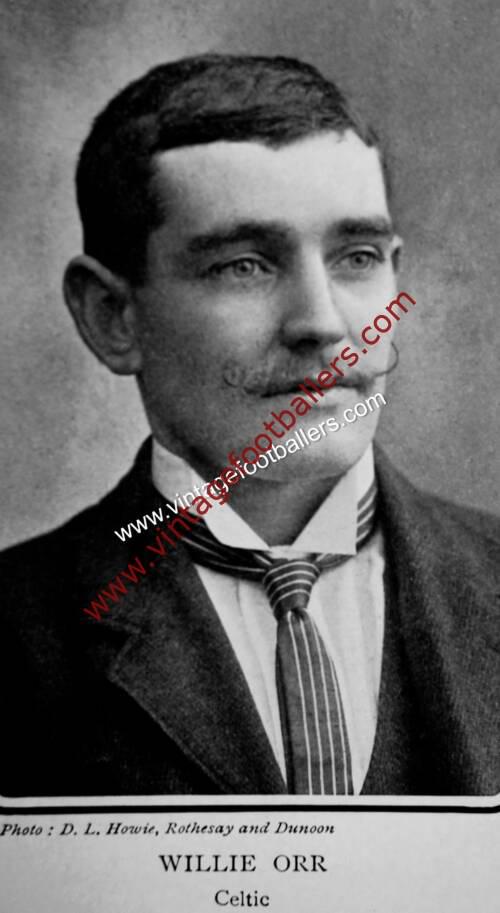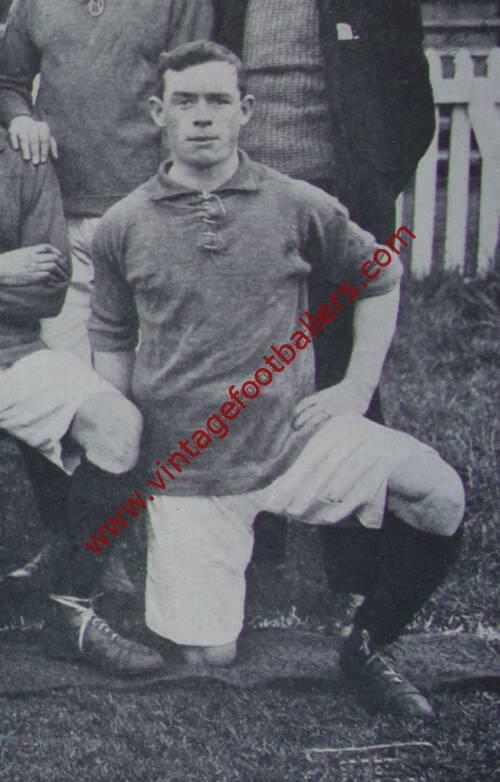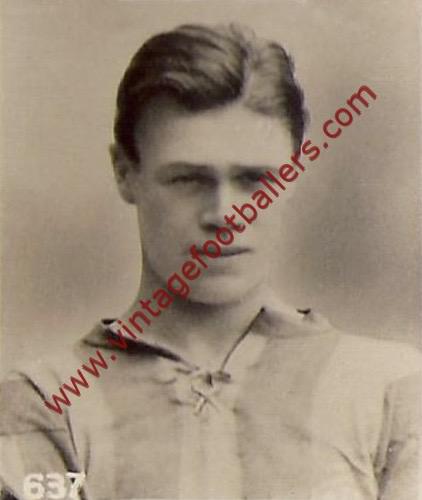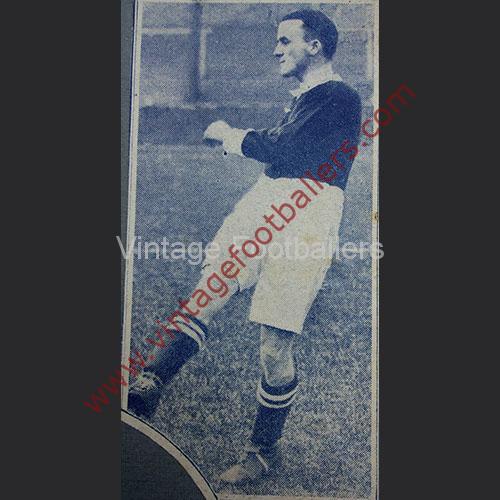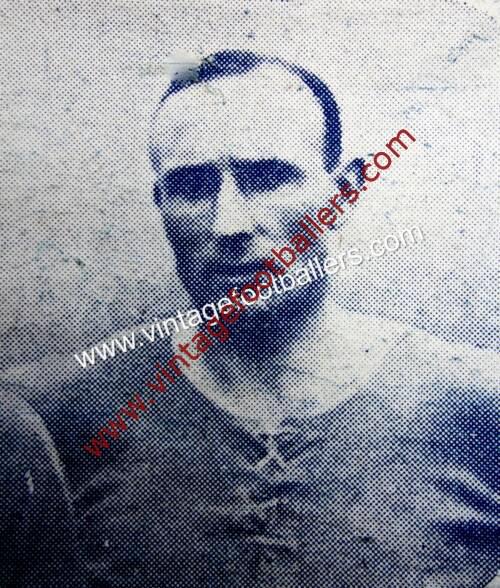Please choose your photo size from the drop down menu below.
If you wish your photo to be framed please select Yes.
Note: 16″x 20″not available in a frame.
Images can also be added to accessories. To order please follow these links
£8.95 – £49.95
Please choose your photo size from the drop down menu below.
If you wish your photo to be framed please select Yes.
Note: 16″x 20″not available in a frame.
Images can also be added to accessories. To order please follow these links
Shotts, Lanarkshire born left half or left back Willie Orr began his football career with junior club Airdrie Fruitfield and joined Airdrieonians in 1893 before moving to First Division club Preston North End in 1894, his Football League debut coming at Sheffield United that October, playing centre half. During three seasons at Deepdale he scored 5 goals in 69 appearances mainly at left half before a return to Scotland to join Glasgow Celtic in May 1897, one of several high profile players signed in the immediate wake of the club converting to a limited company.
It was at Celtic though where he made his name and he was to remain at Celtic for around nine years. An assured performer and his thoughtful but energetic approach to a game quickly made him a great asset to The Bhoys. He made his debut in a 4-1 victory over Hibernian in September 1897 and helped lead Celtic to the Scottish Football League title in his first season there, followed by a Scottish Cup win in 1900. A strong, assured left back, Orr’s influence as a leader shone after he became Celtic captain in 1902 and he led the club to three further Scottish League Championships and two more Scottish Cups, including a double in 1906-07. He scored one of his team’s three goals in the 1907 Scottish Cup Final in the 3-0 victory over Hearts. As it was to be his last full season with Celtic, and in practise the end of his playing career, it was a fine way to cap off his long tenure both at Celtic and within Scottish football.
He was also in the side which relieved Rangers of the 1901 Glasgow Exhibition Cup, when Celtic beat them 3-2 at Cathkin Park. Although when Celtic played Third Lanark in the Glasgow Cup final in Oct 1902 and lost 3-0 it was a case of that “Orr missed his train and Celtic the Cup”.
Orr was first selected for Scotland in March 1900, playing left half in a 3-0 win over Ireland at The Solitude, Belfast. Three years later he played in a 2-0 defeat to Ireland at Celtic Park, and he won his final Scotland cap in a 1-1 draw with Wales at Dens Park in March 1904.
Orr was honoured with a well deserved benefit match, played on the 22nd August 1904, at Celtic Park. There was, according to the Glasgow Herald, “a good attendance” at the match, which saw Celtic play out a goalless draw with Queen’s Park. He eventually retired from play in 1908 after 212 league and Scottish Cup appearances scoring 23 goals and is rightly remembered as being a true Celtic great.
Orr moved into management after his playing career and returned to Airdrie in 1921. His leadership qualities came to the fore, and with the likes of Hughie Gallacher in the team Airdrieonians finished runners-up in the Scottish League in his second season, the club’s highest ever League finish and a position he would achieve for each of the following four seasons, narrowly missing out on the title each time. He also led Airdrieonians to the club’s only ever major honour, winning The Scottish Cup in 1924. When he was appointed as Leicester City’s secretary-manager in July 1926, Willie Orr was by far the most distinguished ex-player to manage the Club. He then guided City to their best ever league position until the Premier League trophy was lifted in 2016.
Despite these achievements, he is probably one of the least known of all Leicester City’s managers.Orr had made his name as a left-back for Aidrieonians before moving to Preston North End in February 1894. Three seasons later he joined Celtic where for the next 10 years he achieved remarkable success as a player.Celtic won the Scottish League in 1898, 1905, 1906 and 1907 and the Scottish Cup in 1900, 1904 and 1907. He was Celtic’s captain from 1902-1906 when he helped nurture what was essentially a young team.
During this time he also won three international caps for Scotland.Orr returned to his old club Airdrie in 1909, first as a Director until 1921 and then as Secretary-Manager. Between 1923 and 1926 he guided Airdrie to four successive runners-up spots (their highest ever league positions) as well as winning the Scottish Cup for the only time in their history in 1924.In April 1925 Willie Orr brought his Airdrie side down to Filbert Street to play a benefit game (for Leicestershire County Cricket Club) against Peter Hodge’s Leicester City, the newly crowned Second Division Champions.
The Club’s archives contain a menu card from the dinner held at the Grand Hotel to mark this occasion. It contains the autographs of the Airdrie players, including that of Hugh Gallacher who later became one of the biggest names in football with Newcastle United, Chelsea and Scotland.A little over a year later, in July 1926, Willie Orr became Leicester City’s manager following Hodge’s decision leave Filbert Street. Orr’s dinner with the Leicester City directors in May 1925 may well have had a bearing on their decision to appoint him as their new manager.
In the three seasons following his appointment Orr, building Hodge’s foundations, took Leicester City to seventh, third and then second in the old First Division. To a team already containing the likes of Adam Black, Arthur Chandler, Johnny Duncan, Ernie Hine and Hughie Adcock, Orr added current and future England internationals Sid Bishop, Len Barry and Sep Smith.
Unfortunately, Orr’s unbroken run of success at Airdrie and Leicester City ended during the three seasons following the high spot of 1929 when his City team came to within a point of being crowned League champions. He resigned in January 1932 following a run of six successive defeats which saw Leicester City near the bottom of the table.
His unsuccessful streak continued at his next club Falkirk. His three years there as Secretary-manager ended in relegation and in a lifetime ban from football following his attempt to bribe an Ayr United player not to play against Falkirk in a vital relegation match. The ban was lifted in February 1937, but Orr never returned to football,
| Weight | N/A |
|---|
